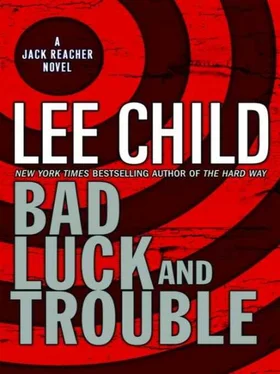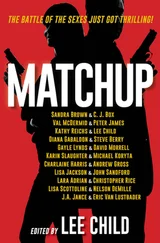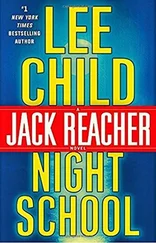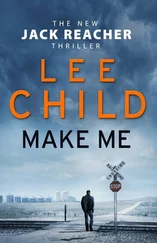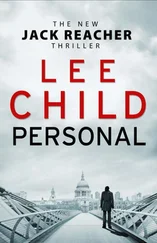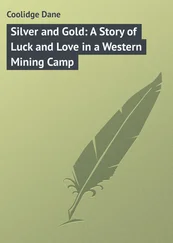Dixon said, “Her husband was just killed. Maybe she was distracted.”
“More likely the opposite. Her husband was killed more than three weeks ago. My guess is she’s over whatever initial reaction she had. Now she’s clinging to Charlie more than ever because he’s all she’s got left. Yet she let the kid get the door. Then she told him to go out to play. She didn’t say to go play in his room. She said, Go out . In Santa Monica? In a yard on a busy street full of passersby? Why would she do that?”
“I don’t know.”
“Because she knew it was safe.”
“How?”
“Because she knew that deputy was watching the house.”
“You think?”
“Why did she wait fourteen days before calling Neagley?”
“She was distracted,” Dixon said again.
“Possibly,” Reacher said. “But maybe there’s another reason. Maybe she wasn’t going to call us at all. We were ancient history. She liked Franz’s current life better. Naturally, because she was Franz’s current life. We represented the bad old days, rough, dangerous, uncouth. I think she was disapproving. Or if not, then a little jealous.”
“I agree,” Neagley said. “That’s the impression I got.”
“So why did she call you?”
“I don’t know.”
“Think about it from the deputies’ point of view. Small department, limited resources. They find a dead guy in the desert, they ID him, they set the wheels in motion. They do it by the book. First thing they do is profile the victim. Along the way they find out that he used to be a part of a shit-hot investigative team in the military. And they find out that all but one of his old buddies are supposedly still around somewhere.”
“And they suspect us?”
“No, I think they dismiss us as suspects and they move right along. But they get nowhere. No clues, no leads, no breaks. They’re stuck.”
“So?”
“So after two weeks of frustration they get an idea. Angela has told them all about the unit and the loyalty and the old slogan, and they see an opportunity. Effectively they’ve got a freelance investigative team waiting in the wings. One that’s smart and experienced and above all one that’s going to be very highly motivated. So they prompt Angela to call us. Just to tell us, nothing more. Because they know that’s the exact same thing as winding up the Energizer Bunny. They know we’re going to get down here pretty damn fast. They know we’re going to look for answers. They know they can just stay in the shadows and watch us and piggy-back on whatever we do.”
“That’s ridiculous,” O’Donnell said.
“But I think it’s exactly what happened,” Reacher said. “Angela told them it was Neagley she had gotten on the phone, they put Neagley’s name on a watch list, they picked her up when she got to town, they tailed her and lay back in the weeds and watched the rest of us show up one by one. And they’ve been watching everything we’ve been doing ever since. Police work by proxy. That’s what Angela wasn’t telling us. The deputies asked her to set us up as stalking horses and she agreed. And that’s why I’m still here. There’s no other explanation. They figure a busted nose is the price of doing business.”
“That’s nuts.”
“Only one way to find out. Take a walk around the block and talk to the deputy.”
“You think?”
“Dixon should go. She wasn’t with us in Santa Ana. So if I’m wrong the guy probably won’t shoot her.”
Dixon went. She left the room without a word. O’Donnell said, “I don’t think Angela was hiding anything today. So I don’t think Franz had a client at all.”
“How hard did you press her?” Reacher asked.
“We didn’t need to press her. It was all right out there. She had nothing to tell us. It’s inconceivable that Franz would have gotten into a thing like this for anyone except a big-deal regular customer who went back years, and it’s inconceivable he could have had such a guy without Angela at least hearing a name.”
Reacher nodded. Then he smiled, briefly. He liked his old team. He could rely on them, absolutely. No second-guessing. If Neagley and Dixon and O’Donnell went out with questions, they came back with answers. Always, whatever the issue, whatever it took. He could send them to Atlanta and they would come back with the Coke recipe.
Neagley asked, “What next?”
“Let’s talk to the deputies first,” Reacher said. “Specifically let’s see if they went out to Vegas.”
“To Sanchez and Orozco’s office? Dixon was just there. It hadn’t been disturbed.”
“She didn’t check their homes.”
Dixon came back thirty minutes later. Said, “He didn’t shoot me.”
“That’s good,” Reacher said.
“I certainly thought so.”
“Did he ‘fess up to anything?”
“He didn’t confirm or deny.”
“Is he mad about his face?”
“Livid.”
“So what’s the story?”
“He called his boss. They want to meet with us. Here, an hour from now.”
“Who’s his boss?”
“A guy called Curtis Mauney. LA County Sheriff ’s Department.”
“OK,” Reacher said. “We can do that. We’ll see what the guy has got. We’ll treat him like some asshole provost marshal. All take and no give.”
They waited the hour downstairs in the lobby. No stress, no strain. Military service teaches a person how to wait. O’Donnell sprawled on a sofa and cleaned his fingernails with his switchblade. Dixon read the seven spreadsheets over and over and then put them away and closed her eyes. Neagley sat alone in a chair against a wall. Reacher sat under an old framed photograph of Raquel Welch. The picture had been taken outside the hotel late in the afternoon and the light was as golden as her skin. The magic hour, photographers called it. Brief, glowing, lovely. Like fame itself, Reacher figured.
The dark-haired forty-year-old calling himself Alan Mason was waiting, too. He was waiting to take a clandestine meeting in his room in the Brown Palace Hotel in downtown Denver. He was uncharacteristically nervous and out of sorts. Three reasons. First, his room was dim and shabby. Not at all what he had been expecting. Second, he had a suitcase stacked against the wall. It was a dark gray hard-shell Samsonite, carefully selected like all his accessories, expensive enough to blend with his air of affluence but not ostentatious enough to attract undue attention. Inside it were bearer bonds and cut diamonds and Swiss bank access codes worth a lot of money. Sixty-five million U.S. dollars, to be exact, and the people he was going to be meeting with were not the kind of people a prudent person would trust around portable and untraceable assets.
And third, he hadn’t slept well. The night air had been full of an unpleasant smell. He had run through a mental checklist until he had identified it as dog food. Clearly there was a factory nearby and the wind was blowing in an unfortunate direction. Then he had lain awake and worried about the dog food’s ingredients. Meat, obviously. But he knew that smell was a physical mechanism that depended on the impact of actual molecules on the nasal lining. Therefore, technically, actual fragments of meat were entering his nostrils. They were in contact with his body. And there were certain meats that Azhari Mahmoud should not be in contact with, ever, under any circumstances.
He stepped to the bathroom. Washed his face for the fifth time that day. Looked at himself in the mirror. Clamped his jaw. He wasn’t Azhari Mahmoud. Not right then. He was Alan Mason, a Westerner, and there was a job to be done.
***
First in through the Chateau Marmont’s lobby door was the banged-up deputy himself, Thomas Brant. He had a vivid bruise on the side of his forehead and the sculptured metal splint on his face was taped to his cheekbones so tight that the skin around his eyes was distorted. He was walking like he hurt. He looked about one-third mad as hell that he had been taken down and one-third sheepish that he had let it happen and one-third pissed that he had to swallow his feelings for the sake of the job. He was followed in by an older guy that had to be his boss, Curtis Mauney. Mauney looked to be approaching fifty. He was short and solid and had the kind of worn look a guy gets when he has been in the same line of work too long. His hair was dyed a dull black that didn’t match his eyebrows. He was carrying a battered leather briefcase. He asked, “Which one of you assholes hit my guy?”
Читать дальше
